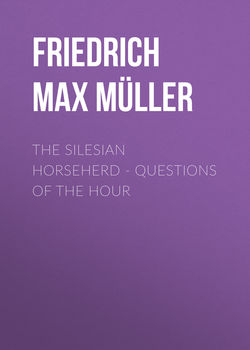Читать книгу The Silesian Horseherd. Questions of the Hour - Friedrich Max Müller - Страница 1
Preface
ОглавлениеThe story of this volume is soon told. In July, 1895, Professor Max Müller contributed to the Deutsche Rundschau an essay on the lost treatise against Christianity by the philosopher Celsus, known to us through the reply of Origen of Alexandria. This essay, entitled “The ‘True History’1 of Celsus,” contained an exposition of the doctrine of the Logos and its place in Christian teaching, with reference also to its applications in our modern thought. Among the comments upon it which in due time found their way to Oxford, was a vigorous, if familiar, letter (dated February, 1896) from a German emigrant to the United States, residing in Pennsylvania, who signed himself by the unusual name of the Pferdebürla, or “Horseherd.”2 His criticisms served as a fair sample of others; and his letter was published with a reply from Professor Max Müller in the Rundschau of November, 1896. More letters poured in upon the unwearied scholar who had thus set aside precious time out of his last years to answer his unknown correspondent. One of these, from “Ignotus Agnosticus,” supplied a text for further comment, and the whole grew into a little popular apologia, which was published at Berlin in 1899, and entitled Das Pferdebürla, or “Questions of the Day answered by Friedrich Max Müller.”
The veteran teacher thus enforced once more his ideas of the relation of language and thought, in which he had long since recognised the clue to man's knowledge of the relation of his spirit to God. This inner union he found realised in Christ, according to the testimony of the Fourth Gospel;3 and the lucid treatment of this great conception, freed from the technicalities of theology, will possibly prove to some readers the most helpful portion of this book. Ranging over many topics, once the themes of vehement controversy, the discussion has often an intimate, familiar, personal air. The disputants on opposite sides had drawn nearer; they could better understand each other's points of view.4 These pages, therefore, reveal the inmost beliefs of one who had devoted more than fifty years to the study of the history of religious thought on the widest scale, and had himself passed through severe struggles and deep griefs with unshaken calm. No reader of Max Müller's writings, or of the Life and Letters, can fail to recognise in these trusts the secret unity of all his labours. The record of human experience contained in the great sacred literatures of the world, and verified afresh in manifold forms from age to age, provided a basis for faith which no philosophy or science could disturb.
This is the key to the reasonings and appeals of this little book. It was translated as a labour of love by Mr. Fechter, Mayor of North Yakima, in the United States. The translation has been revised on this side of the Atlantic, and is now offered to the public in the belief that this final testimony of a “voice that is still” to the reality of “things unseen” will be welcome to many inquiring and perhaps troubled minds.
J. ESTLIN CARPENTER.
Oxford, April 2, 1903.
1
The Greek term “logos” was rendered Geschichte in the German title.
2
The word Pferdebürla is apparently a Silesian equivalent for Pferdebursche, and is represented in this volume by the term “horseherd,” after the analogy of cowherd, swineherd, or shepherd. The termination bürla is probably a local corruption of the diminutive bürschel or bürschlein.
3
“What difference does it make,” he would ask, “whether it was written by the son of Zebedee, or some other John, if only it reveals to us the Son of God?” (letter from the Vicar of St. Giles's, Oxford, Life and Letters, II, Chap. xxxvi.).
4
See the letters between Max Müller and Dr. G. J. Romanes, Life and Letters, II, Chap. xxxi.
